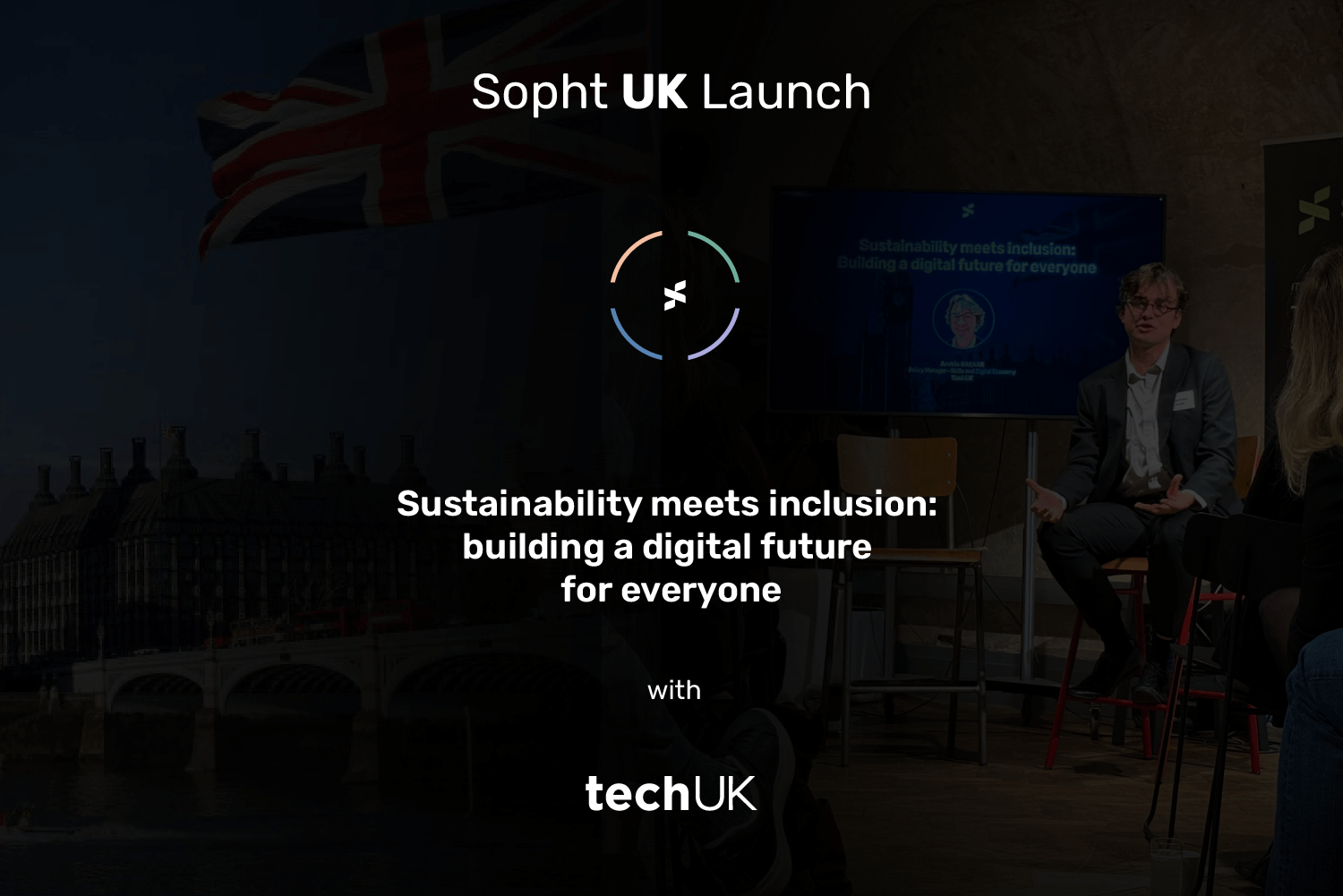During Sopht’s UK Launch, Archie Breare, Policy Manager for Skills and Digital Economy at TechUK, explored why digital inclusion must sit alongside environmental sustainability in shaping the future of technology.
The Human Cost of Digital Exclusion
Archie opened with a stark reality: digital technology is rapidly embedding itself into every aspect of daily life, creating both unprecedented opportunities and devastating barriers for those left behind.
The statistics tell a concerning story. 9% of households struggle to afford mobile connectivity, while 16% of adults lack basic digital skills. But behind these numbers are real people facing real consequences.
Archie shared the story of a 90-year-old woman who missed her vaccination appointment because she couldn’t access the online booking system. “Digital transformation is both a really good prompt to get people included and a potential source of exclusion, depending on how we manage it,” he explained.
Yet technology can also open doors. Archie recounted meeting a man who discovered an online community centered around his passion for angling, where “he found a community of people that he could share his interest.” This is what digital inclusion should achieve: “opening the horizons that people have.”
A Top-Tier Policy Priority
When asked whether digital inclusion resonates at the highest levels of government and business alongside environmental concerns, Archie’s response was emphatic: absolutely.
The topic has gained significant traction among senior policymakers. Archie noted meetings with “the permanent secretary interested in the subject,” where officials recognized that inclusion is going to be “a really important part of making any scheme work.” Digital inclusion is no longer a niche concern—it’s become a strategic imperative.
Building Momentum
The landscape is shifting rapidly. “When we first looked in the market, like, what, two years ago?” the momentum around digital inclusion was much slower, Archie recalled. Today, there’s a real “dynamic growing in the UK” with “everything is coming together.”
This growing momentum must be channeled strategically to ensure that technological efficiency drives social equity alongside environmental sustainability.
The Unfinished Mission
Archie was candid about the road ahead. Digital inclusion is “not a mission that we’ve finished by any means,” and it’s “not a mission that we’re going to finish any time soon.” It requires constant, dedicated effort from businesses, government, and civil society.
The message is clear: as we design sustainable digital systems, we must ensure they are also accessible and beneficial to everyone.
Looking Ahead
As the digital world evolves, inclusion must remain central to sustainability, ensuring that the systems we design for the planet also work for the people who live on it.
Share this article on social media
During Sopht’s UK Launch, Archie Breare, Policy Manager for Skills and Digital Economy at TechUK, explored why digital inclusion must sit alongside environmental sustainability in shaping the future of technology.
The Human Cost of Digital Exclusion
Archie opened with a stark reality: digital technology is rapidly embedding itself into every aspect of daily life, creating both unprecedented opportunities and devastating barriers for those left behind.
The statistics tell a concerning story. 9% of households struggle to afford mobile connectivity, while 16% of adults lack basic digital skills. But behind these numbers are real people facing real consequences.
Archie shared the story of a 90-year-old woman who missed her vaccination appointment because she couldn’t access the online booking system. “Digital transformation is both a really good prompt to get people included and a potential source of exclusion, depending on how we manage it,” he explained.
Yet technology can also open doors. Archie recounted meeting a man who discovered an online community centered around his passion for angling, where “he found a community of people that he could share his interest.” This is what digital inclusion should achieve: “opening the horizons that people have.”
A Top-Tier Policy Priority
When asked whether digital inclusion resonates at the highest levels of government and business alongside environmental concerns, Archie’s response was emphatic: absolutely.
The topic has gained significant traction among senior policymakers. Archie noted meetings with “the permanent secretary interested in the subject,” where officials recognized that inclusion is going to be “a really important part of making any scheme work.” Digital inclusion is no longer a niche concern—it’s become a strategic imperative.
Building Momentum
The landscape is shifting rapidly. “When we first looked in the market, like, what, two years ago?” the momentum around digital inclusion was much slower, Archie recalled. Today, there’s a real “dynamic growing in the UK” with “everything is coming together.”
This growing momentum must be channeled strategically to ensure that technological efficiency drives social equity alongside environmental sustainability.
The Unfinished Mission
Archie was candid about the road ahead. Digital inclusion is “not a mission that we’ve finished by any means,” and it’s “not a mission that we’re going to finish any time soon.” It requires constant, dedicated effort from businesses, government, and civil society.
The message is clear: as we design sustainable digital systems, we must ensure they are also accessible and beneficial to everyone.
Looking Ahead
As the digital world evolves, inclusion must remain central to sustainability, ensuring that the systems we design for the planet also work for the people who live on it.


